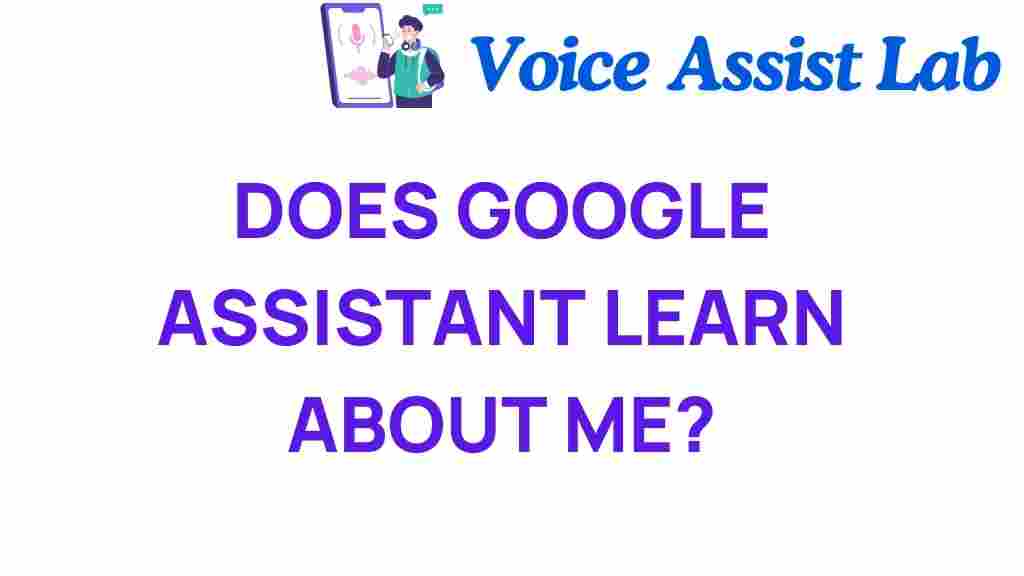Unveiling the Secrets: Does Google Assistant Learn About You?
In the age of technology, voice assistants have become an integral part of our daily lives. Among these, Google Assistant stands out as a powerful tool powered by artificial intelligence (AI) and machine learning. But as we integrate Google Assistant into our routines, a pressing question arises: does Google Assistant learn about you? This article delves into the intricacies of Google Assistant, exploring how it utilizes personal data while addressing privacy concerns that may arise.
Understanding Google Assistant and AI Learning
Google Assistant is a voice-activated digital assistant that allows users to perform various tasks, from setting reminders to controlling smart home devices. The core of Google Assistant’s functionality lies in AI learning and machine learning, which enable it to improve its performance over time. Here’s how it works:
- Natural Language Processing (NLP): Google Assistant employs NLP to understand and interpret user queries more effectively.
- Data Input: Every interaction with Google Assistant generates data, which is used to enhance its responses and functionalities.
- Personalization: The more you use Google Assistant, the better it becomes at anticipating your needs and preferences.
Does Google Assistant Learn About You?
Yes, Google Assistant does learn about you, and this process is facilitated through the collection and analysis of personal data. Here’s how this learning occurs:
- Voice Recognition: Google Assistant stores your voice data, which allows it to recognize your voice and understand your speech patterns.
- Search History: Your search queries inform Google Assistant about your interests and preferences.
- Location Data: Google Assistant uses your location to provide relevant information and services, such as traffic updates and local recommendations.
This tailored user experience enhances the utility of Google Assistant, making it more responsive and useful. However, users must also be aware of the implications this has for their personal data and privacy.
Privacy Concerns with Google Assistant
With the convenience of a personalized digital assistant comes the risk of privacy concerns. Users should consider the following:
- Data Security: Storing personal data can lead to potential security breaches. If hackers gain access, sensitive information could be compromised.
- Data Usage: Google Assistant uses your data to improve services, but this data may also be utilized for targeted advertising, raising concerns about how your information is shared.
- Informed Consent: Many users may not be fully aware of what data is being collected and how it is used.
To better protect your digital privacy, it’s essential to be proactive and informed about your interactions with Google Assistant.
Managing Your Personal Data with Google Assistant
To ensure that your personal data is handled according to your preferences, follow these steps:
- Review Privacy Settings: Navigate to the Google Account privacy settings and review what data is being collected.
- Manage Your Voice Recordings: You can listen to and delete your voice recordings stored by Google Assistant.
- Limit Location Sharing: Adjust location settings to minimize the data Google Assistant collects about your whereabouts.
- Opt-Out of Personalization: If you prefer not to have your data used for personalization, you can opt-out in the settings menu.
Enhancing Your User Experience
Google Assistant offers a plethora of features designed to enhance user experience. Here are some tips to get the most out of your voice assistant:
- Customize Your Preferences: Set up your Google Assistant to recognize your voice for personalized responses.
- Use Routines: Automate tasks with routines that trigger multiple actions with a single command.
- Explore Integrations: Connect Google Assistant with other smart home devices for seamless control.
By taking advantage of these features, you can further enhance your interaction with Google Assistant while also being mindful of your personal data.
Troubleshooting Common Issues
Despite its advanced capabilities, users may encounter some issues while using Google Assistant. Here are common problems and their solutions:
- Google Assistant Not Responding: Ensure that your device is connected to the internet and that “Hey Google” detection is enabled.
- Inaccurate Responses: If responses are off-mark, try rephrasing your question or ensure that the microphone is clean and unobstructed.
- Difficulty with Voice Recognition: If Google Assistant struggles to recognize your voice, retrain it by going to Assistant settings and adjusting voice model settings.
Conclusion: Balancing Convenience and Privacy
In conclusion, Google Assistant indeed learns about you through various means, including personal data collection and machine learning algorithms. While this results in a richer and more personalized user experience, it also raises significant privacy concerns that cannot be overlooked. By understanding how Google Assistant operates and taking proactive steps to manage your data, you can enjoy the benefits of this advanced technology while maintaining control over your digital privacy.
As voice assistants become increasingly integrated into our lives, staying informed about their functionalities and privacy implications is crucial. Embrace the convenience of Google Assistant, but always remain vigilant about your personal data.
For more information on digital privacy and technology, check out this comprehensive guide on managing your online footprint.
This article is in the category Innovations and created by VoiceAssistLab Team
